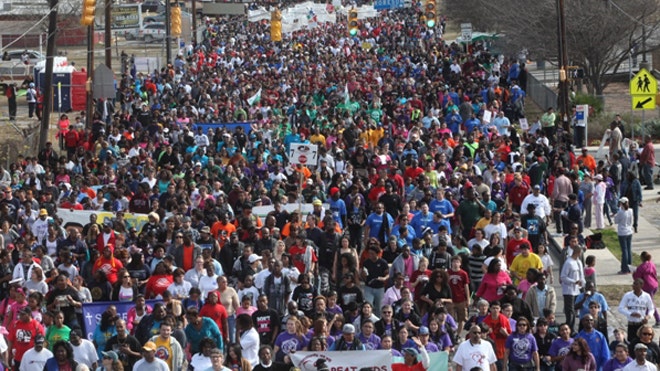Who Knew?
One of the largest celebrations in this nation for Martin Luther King Day takes place in a city that has a small African American community, and a Latino majority.
San Antonio, Texas, where Latinos make up 63 percent of the city’s 1.4 million residents, and blacks 7 percent and whites 26.6 percent, has been celebrating the late civil rights leader’s birthday since 1987 and attracting one of the biggest crowds anywhere in the United States.
The annual march attracts some 100,000 people, according to city figures. Last year the crowd was 150,000, say organizers. Large crowds also attend the various other activities around the city that focus on King’s life and legacy.
“The fact that our city hosts one of the largest Martin Luther King Jr., marches in the nation reflects why San Antonio is a city on the rise,” said San Antonio Mayor Julián Castro in a written statement. “People of all backgrounds throughout history have found a place in San Antonio’s diverse cultural communities.”
Some published accounts say San Antonio began observing King’s life and contributions to racial justice with a modest annual procession begun by a pastor who had pushed for a statue of the civil rights leader.
In 1986, under the mayoralty of Henry Cisneros, city officials passed a resolution establishing the San Antonio Martin Luther King Jr. Commission, which paved the way for the annual celebration. Community activist Aaronetta Pierce and the late Rev. Claude Black, known in San Antonio for his civil rights work, were forces behind the city’s full embrace of celebrating and promoting King’s struggle for equality.
Bishop David M. Copeland, the chair of the San Antonio Martin Luther King Commission, told Fox News Latino that the annual celebration has grown steadily in size and its mission.
While published reports commonly describe San Antonio's march as one of the largest for Martin Luther King's birthday in the United States, Copeland asserts that it is "the largest."
Work on Martin Luther King Day-related events begins a full seven months before, and involves about a dozen committees.
The weeks leading up to the march, which this year is Jan. 20, include seminars, musical performances, art workshops and oratorical contests for school children.
Some of the speakers and performers this year, when the theme is “Realizing The Dream: Jobs, Justice and Freedom,” include economist Julianne Malveaux, music star Sean Paul and AFL-CIO president Richard Trumka.
The commission has expanded its focus to go beyond the January events, Copeland said. For example, for years it has given out about 20 scholarships, averaging about $1,000, to graduating high school seniors annually. In recent years, though, the scholarships have risen to about $2,000 each.
The commission is hoping to raise more than $100,000, Copeland said, “so that we can give better scholarships,” noting that college is expensive.
“We want to promote education, to promote learning,” he said. “That takes more than just marching two and a half miles every year.”
Graciela Sanchez of the Esperanza Peace and Justice Center in San Antonio said that Latinos and African Americans in the city have often teamed up to address issues of concern to both communities.
She noted that two Latinos are members of the city’s Martin Luther King Commission.
Elsewhere in the nation, many have noted the special influence that King continues to have on Latinos and their civil rights struggles.
Donna Maria Blancero, an associate professor at Bentley University in Massachusetts, wrote last year: “Dr. King inspired many Latinos, including Cesar Chavez and Dolores Huerta.”
She noted that for the first time, last year, “a Latino, Reverend Samuel Rodriguez, [gave] the keynote address at Dr. King’s commemorative service at King’s own Ebenezer Baptist Church.”
"Latinos, just like other Americans, consider Dr. King a great leader of the civil rights movement," Blancero wrote. "If he were alive today, he likely would be working side by side with Latinos to address issues of inequality.”
Elizabeth Llorente can be reached elizabeth.llorente@foxnewslatino.com


No comments:
Post a Comment